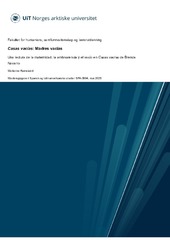Casas vacías: Madres vacías
Author
Ramsland, MarianneAbstract
Esta tesis analiza la novela Casas vacías (2019) de Brenda Navarro desde una perspectiva socioliteraria y feminista, con el objetivo de mostrar cómo la obra desmitifica la maternidad como fuente de identidad y realización personal. A través de las voces de dos mujeres –una madre biológica y otra que secuestra a su hijo– la novela cuestiona los ideales de la “buena madre” y revela cómo las maternidades impuestas o no deseadas pueden conducir al vacío, la frustración y la alienación. El análisis se apoya en los aportes teóricos de Adrienne Rich, Simone de Beauvoir, Elisabeth Badinter y otras autoras, y considera tanto las condiciones sociales de las protagonistas como su forma de narrar. Se concluye que Casas vacías es una obra clave dentro del debate literario y social sobre la maternidad contemporánea, al visibilizar sus dimensiones conflictivas, especialmente en contextos de desigualdad estructural, violencia y precariedad afectiva. This thesis explores Brenda Navarro’s novel Casas vacías (2019) from a socioliterary and feminist perspective, aiming to demonstrate how the narrative dismantles the idealization of motherhood as a source of identity and personal fulfillment. Through the voices of two women –one, a biological mother, the other a woman who kidnaps her child– the novel challenges normative concepts of the “good mother” and exposes how imposed or unwanted motherhood can lead to emotional emptiness, frustration, and alienation. The analysis draws on feminist theory, particularly the work of Adrienne Rich, Simone de Beauvoir, and Elisabeth Badinter, and examines both the protagonists’ social conditions and their narrative voices. The study concludes that Casas vacías plays a crucial role in current literary and social debates on motherhood by exposing its complexities, especially within contexts marked by structural inequality, violence, and emotional precarity.
Publisher
UiT The Arctic University of NorwayMetadata
Show full item recordCollections
Copyright 2025 The Author(s)


 English
English norsk
norsk
